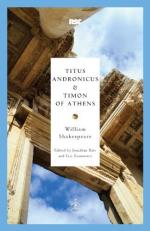|
This section contains 7,982 words (approx. 27 pages at 300 words per page) |

|
SOURCE: “Biological Finance in Shakespeare's Timon of Athens,” in English Literary Renaissance, Vol. 21, No. 3, Autumn, 1991, pp. 349-70.
In the essay below, Chorost discusses Timon's attempt to secure devotion through gift giving, exploring the economic and biological dimensions of the plot.
Timon of Athens is a critique of money and money-oriented economies. Timon runs a lavish court which seems rich in friendship, but is rich only in money.1 Most of Timon's “friends” are usurers who mouth platitudes of loyalty while draining his treasury with high-interest loans. When he runs out of his own money and turns to them for more, they withhold credit, reducing him to destitution.
In his disillusioned rage Timon indicts, among other things, money itself and economies predicated upon the use of money. This indictment is the central theme of the play. Money is shown to destroy not only human relationships but also the reproductive power...
|
This section contains 7,982 words (approx. 27 pages at 300 words per page) |

|


